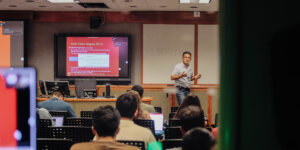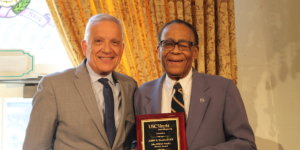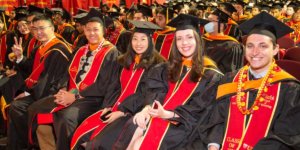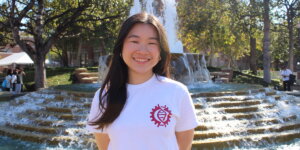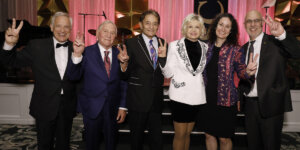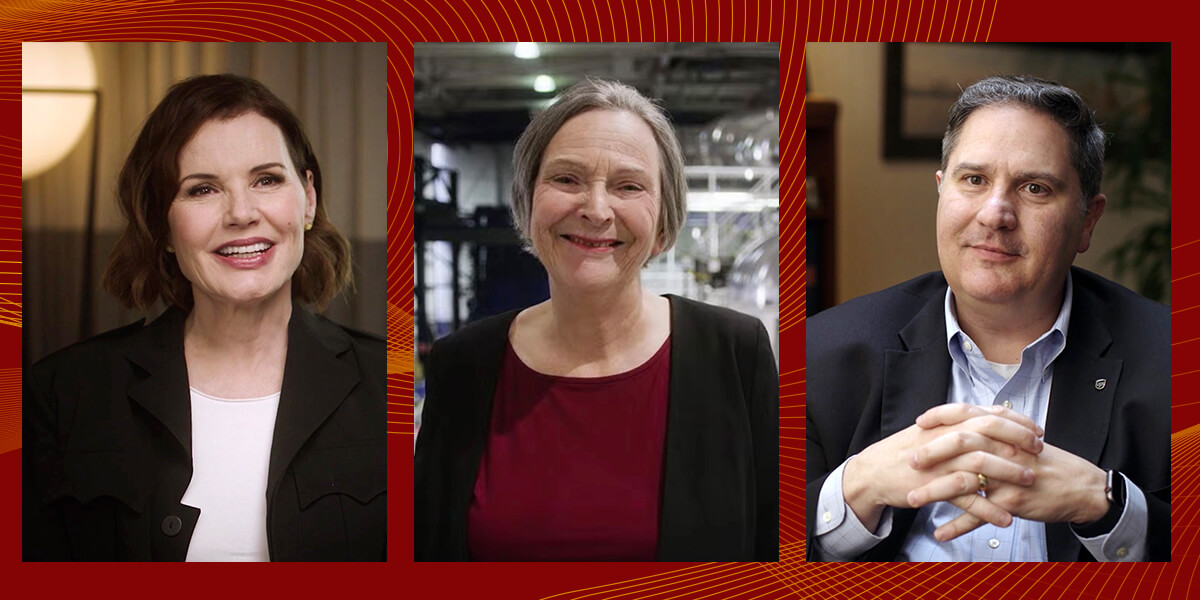
Awardees (from left to right) Geena Davis, General Ellen Pawlikowski and Juan Perez
A year after its postponement because of the COVID-19 pandemic, the Viterbi Awards finally returned Thursday, April 8, to honor the power of engineering.
At the 42nd annual “Academy Awards of engineering,” USC Viterbi friends, faculty, students and staff gathered over Zoom for a joyous evening of celebration. Guests, some of whom even dressed in formal attire, interacted with each other at virtual tables in a virtual ballroom, a stand-in for the Beverly Wilshire Hotel, the event’s longtime home. Attendees also visited a virtual photo booth, sharing selfies and snapshots on social media with the hashtags #viterbiawards and #USCViterbi. For the first time ever, the event was livestreamed due to the generosity of event sponsors.
After welcoming the online audience, USC Viterbi Dean Yannis C. Yortsos spoke about how well the school responded to the myriad challenges after the “wavefunction collapsed” in spring 2020 with the emergence of the coronavirus. USC Viterbi made a nearly seamless transition to online education “enabled through the might of technology,” he said. “We all configured new innovative ways to pursue engineering education and research under constraints we never imagined possible.”
Yortsos also highlighted the contributions that the school’s faculty have made to mitigate the impact of the contagion. USC Viterbi researchers have modeled the epidemic, combatted online misinformation about the virus, and even produced and disseminated personal protective equipment (PPE). Additionally, USC Viterbi has played an integral role in the formation and success of the National Academy of Engineering’s Call to Action against COVID-19.
Looking forward, the dean said he optimistically looks to engineers to leverage technology to build a better post-COVID 19 society.
“The world will impatiently need talented engineers with their skills and their mindsets as soon as possible to help us engineer a fast recovery and a new and bright future,” he said.
The Viterbi Awards celebrated three distinguished honorees whose “innovation, ingenuity and impact in engineering and society are making a difference,” Yortsos said.
Awardees included General Ellen Pawlikowski, a retired United States Air Force general and Judge Widney Professor at USC Viterbi, who received the Daniel J. Epstein Engineering Management Award; Juan Perez, B.S. ISE ’88, M.S. CME ’90, chief engineering and information officer at UPS, winner of the Mark A. Stevens Distinguished Alumni Award; and Academy Award winner Geena Davis, founder and chair of the Geena Davis Institute on Gender in Media, who accepted the inaugural Engineering Influencer Award.
Daniel J. Epstein Engineering Management Award
Ellen Pawlikowski, a retired Air Force four-star general and Judge Widney Professor at USC Viterbi
General (retired) Ellen Pawlikowski received the Daniel J. Epstein Engineering Management Award, an honor that recognizes the professional achievements and contributions to the field of engineering.
Pawlikowski is also an independent consultant providing expertise on strategic planning, program management, logistics, and research and development. She serves on the board of directors for the Raytheon Company, Intelsat SA, Applied Research Associates, and SRI International.
The third woman to rise to the rank of four-star general in the U.S. Air Force, General Pawlikowski served for over 40 years in the military. Her last assignment was as commander of the Air Force Materiel Command at the Wright-Patterson Air Force Base in Ohio. General Pawlikowski oversaw all Air Force technology development, aircraft systems and sustainment, and installation management, leading 80,000 people with an annual budget of $60 billion.
Pawlikowski entered the Air Force in 1978 as a distinguished graduate of the ROTC program at the New Jersey Institute of Technology in Newark. She then attended the University of California at Berkeley as a Fannie and John Hertz Foundation Fellow and received a doctorate in chemical engineering in December 1981.
Pawlikowski’s career has spanned a wide variety of technical management, leadership and staff positions. She commanded five times as general officer and also served as the program director and program executive officer for several multibillion-dollar military-system acquisitions.
Pawlikowski is nationally recognized for her leadership and technical management acumen. Among her recognitions are the Women In Aerospace Lifetime Achievement Award; the NDIA’s Peter B Teets Award; and the Air Force Association Executive Management Award. She is a Honorary Fellow of the American Institute of Aeronautics and Astronautics and a member of the National Academy of Engineering.
“Thank you for the recognition and for make me feel like such a special part of the Trojan Family,” she said at the Viterbi Awards.
Mark A. Stevens Distinguished Alumni Award
Juan Perez, B.S. ISE ’88, M.S. CME ’90, chief engineering and information officer at UPS
Juan Perez, B.S. ISE ’88, M.S. CME ’90, chief information and engineering officer for UPS, was honored with the Mark A. Stevens Distinguished Alumni Award. This award goes to a USC Viterbi alumnus or alumna in recognition of their exemplary professional accomplishments and exceptional contributions to the field of engineering.
After graduating from USC Viterbi, Perez landed a job with UPS. His first manager put him straight to work, offering him a new role developing technology projects, while also giving Perez firsthand experience of day-to-day operations by loading trucks. Perez was soon enlisted as a UPS driver. His neighborhood: the leafy streets of Beverly Hills.
Over the past three decades, Perez’s career has run the gamut at UPS, from operations, process management and technology to the organization’s corporate, U.S. and international business units.
Perez has been a driving force in UPS’s evolution into advanced analytics, moving the company from a reliance on historical data to predictive and prescriptive analytics. Since April 2017, Perez has served as the company’s chief information and engineering officer, responsible for all technology and engineering functions. Perez also serves as the executive advisor for the UPS Latino Business Resource Group, which supports diversity across the enterprise.
One of his most significant impacts has been his work with the team that developed ORION, the On-road Integrated Optimization and Navigation system that optimizes delivery routes to improve service and efficiencies. ORION has enabled the reduction of 100 million miles driven annually, saved 10 million gallons of fuel annually, and cut greenhouse emissions by 100,000 metric tons annually.
Perez has received numerous awards and accolades, including CIO of the Year by the Georgia CIO Leadership Association.
“I am just so proud to be included in tonight’s celebration with all of you,” he said.
Engineering Influencer Award
Geena Davis, founder and chair of the Geena Davis Institute on Gender in Media and Academy Award-winning actor
In her introduction of Geena Davis, founder and chair of the Geena Davis Institute on Gender in Media, USC President Carol Folt noted that the Academy Award winner has helped change how and how often women and girls are portrayed in media.
“We’re honoring someone who is all about creating change, lasting change,” Folt said of Davis, recipient of newly created award. “She is no engineer, at least not in the traditional sense. But she’s at the heart of what Viterbi is doing: and that’s to change the world.”
Davis – who received the 1989 Academy Award for best supporting actress for “The Accidental Tourist” and a nomination for her performance as Thelma in “Thelma and Louise,” founded her namesake institute in 2004. With the support of a technology grant from Google.org, Davis, CEO Madeline Di Nonno and the institute’s research team started collaborating with University Professor Shrinkath Narayanan and a group of engineers at USC Viterbi’s Signal Analysis and Interpretation Laboratory, or SAIL.
Together, they created a software tool to automate the identification of gender, screen time and speaking time. Called the Geena Davis Inclusion Quotient, or GD-IQ, the Google-funded project incorporates AI technology to analyze movies, TV shows and ads. This technology continues to be developed and aims at illuminating representations and portrayals of people from a diversity and equity perspective using inclusive engineering approaches.
“I am so grateful for the partnership,” Davis said.
Thanks to Davis’s efforts at creating awareness about these disparities and sharing quantitative data with Hollywood studios, film and television content creators have begun to increase the percentages of female characters — and reduce gender stereotyping — in media targeting children 11 and under. In 2019 and 2020, the institute achieved two of its mission goals by achieving gender parity for female lead characters in the top Nielsen rated children’s television shows and gender parity for female lead characters in the top 100 largest grossing family films.
In 2015, Davis cofounded the Bentonville Film Festival, an unprecedented initiative in support of women and diversity in the entertainment industry and serves. Three years earlier, she was appointed Special Envoy for Women and Girls in ICT for the UN’s International Telecommunication Union (ITU)
A member of the genius society Mensa, Davis holds honorary degrees from Boston University, Bates College and New England College.
Davis’s other acting credits include a Golden Globe nomination for best actress in “A League of Their Own” and appearances in such iconic films as “Tootsie,” “The Fly,” “Beetlejuice,” “The Long Kiss Goodnight,” and “Stuart Little.” She also received the 2019 Jean Hersholt Humanitarian Award (Governors Award) from the Academy of Motion Picture Arts and Science for her work in promoting gender parity on screen.
The Maseeh Entrepreneurship Prize Competition (MEPC) and the Min Family Challenge (MFC)
With its proximity to Silicon Beach and a commitment to leveraging technology for the benefit of all, USC Viterbi has become a veritable engine for dynamic startups.
Companies such as Second Spectrum, which analyzes big data for insights into sport performance for NBA teams, and Stasis Labs, which manufactures a bedside technology that allows healthcare providers to remotely monitor patients’ vital signs, have emerged from the school.
The Maseeh Entrepreneurship Prize Competition (MEPC) and the Min Family Challenge (MFC), have played an integral role in USC’s Viterbi ascension to the ranks of the most entrepreneurial engineering schools in the country.
The Maseeh Entrepreneurship Prize Competition, founded in 2010 with a $1 million endowment from entrepreneur Fariborz Maseeh, has become one of the premier business model contests for USC Viterbi and students, faculty and would-be business builders.
The contest is co-sponsored by the National Science Foundation Innovation Corps or “I-Corps” program, supporting students in transitioning technologies from interesting experiments to meaningful solutions. During the competition, students conduct customer discovery while refining the technology’s potential value to the marketplace. MEPC also offers cash prizes and free legal services of more than $100,000, including $50,000 to the winning team.
The Min Family Challenge is a business model contest that encourages would-be social entrepreneurs to build businesses to benefit the underprivileged locally, nationally and even worldwide. Launched in 2015 with a generous gift by alumnus Bryan Min, his wife Julie, and their children Brandon and Brittany, both USC graduates, MFC gives USC Viterbi students a new way of solving societal problems through the lens of social entrepreneurship and engineering innovation. At stake is a $50,000 grand prize.
The visionary program has employed student entrepreneurship to help hurricane victims in Texas; refugees on the Greek Island of Lesbos; and underrepresented populations in the United States.
At the Viterbi Awards, a short video was shown spotlighting last year’s MEPC winner, GrayMatter Robotics, and the 2020 MFC victor, EcoLearner, formerly known as AgriCulture.
Year In Review
Although one of the most difficult years in the school’s history, 2020 (and the first quarter of 2021) again demonstrated USC Viterbi’s ability to face myriad challenges head on. USC Viterbi not only survived, but it has thrived, innovated and led.
In fact, for 115 years, USC engineering has leveraged technology for useful purposes, including combatting another pandemic, that of 1918.
As a measure of the school’s overall excellence, USC Viterbi was named by U.S. News & World Report in the top five graduate engineering programs among private engineering schools, after MIT, Stanford University, Caltech and Carnegie Mellon University. The magazine also selected the school’s online program, DEN@Viterbi, as among the nation’s best.
USC Viterbi faculty continued to receive national recognition. In February 2021, Jong-Shi Pang, Epstein Family Chair and professor of industrial and systems engineering, and Azad Madni, professor of astronautical engineering were inducted into the National Academy of Engineering. A few months earlier, Scott Fraser, Provost Professor with a joint appointment at USC Dornsife, was inducted into the National Academy of Medicine.
In spring 2020, six USC Viterbi junior faculty members – Aleksandra Korolova, Daniel McCurry, Haipeng Luo, Mitul Luhar, Qiming Wang and Megan McCain – won the 2020 NSF Career Award. Three more, Jyo Deshmukh, Heather Culbertson and Constantine Sideris, have just received the same NSF honor.
Dean Yortsos said he expects the engineering school to continue to do great things.
“I feel so optimistic about the future of engineering, especially here at USC Viterbi,” Dean Yortsos said.
The Viterbi Awards
Published on April 12th, 2021
Last updated on November 11th, 2022




